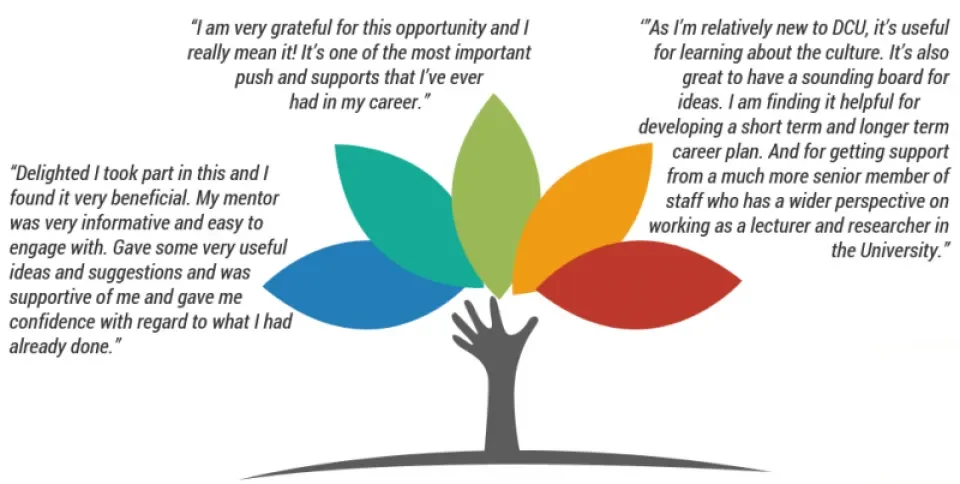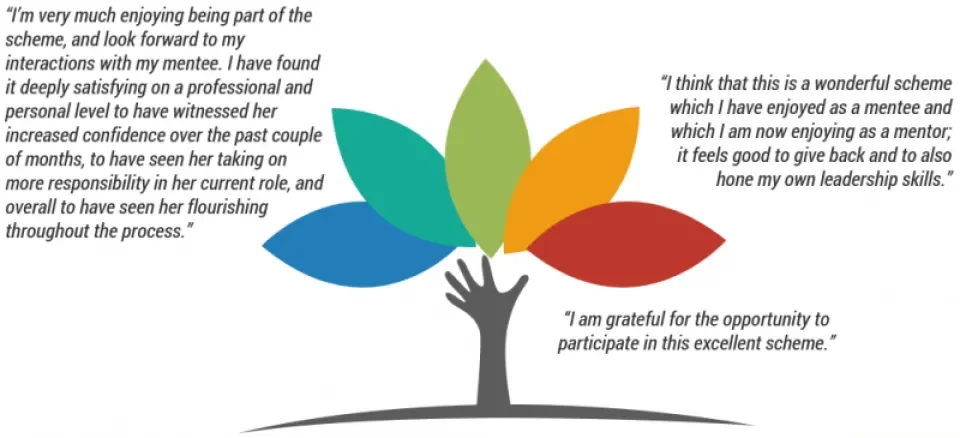

Staff Mentoring
Welcome to DCU's Mentoring Scheme
With its potential to have a transformative effect on your career, the DCU Mentoring Scheme offers personal and professional benefits for mentors and mentees alike.
Focus:
- Discovering and transforming talent
- Maximising your creative development
Who:
The scheme is available to all staff across the University (however, please note that to be eligible to apply, staff must have a contract of employment of at least 12 months from the date of application to the mentoring scheme)
Interested in mentoring a colleague at DCU?
Experienced mentors are integral to the continued success of the programme. One hour a month of your time could have a hugely positive impact on the career of a less experienced colleague. If you are a senior academic, research or professional member of staff (or recently retired) and would like to support the development of others please register your interest through the 'How to Apply' section below or contact us at learning.development@dcu.ie if you would like more information.
Wish to avail of a mentor?
Please register your interest through the 'How to apply' section below.
Mentoring is to support and encourage people to manage their own learning in order that they may maximise their potential, develop their skills, improve their performance and become the person they want to be.
Eric Parsloe, The Oxford School of Coaching & Mentoring
Mentoring is defined as a workplace relationship where a more experienced staff member is committed to providing developmental assistance and guidance to a less experienced staff member through a series of regular meetings.
Throughout the mentoring process:
- The mentee retains responsibility for their own learning and development
- The mentoring relationship provides possibilities for learning and growth for both the mentee and the mentor
- The mentoring conversations are a balance between knowledge transfer and genuine open discussion between two people who have mutual respect
The primary outcome of mentoring is that the mentee will gain knowledge and a greater recognition of their own potential and capabilities, which will help them to flourish in their professional and personal life.
A key feature of mentoring is that it provides an opportunity to focus on the questions and issues that you have right now. These could include:
Leadership
I am about to take on a new role - how do I adapt to this new role?
How can I enhance my communication and influencing skills?
Focus
What are my main priorities in terms of my career, professional and personal development?
How could I improve my chances of getting more research funding?
How can I receive recognition for my work achievements and maintain motivation during this time of limited promotions?
Connectedness
How can I keep up to date with what is happening given all the changes in the third level sector?
How can I raise my profile, both within and outside of DCU?
Engaging in mentoring can genuinely transform how you picture yourself and your capabilities. It can maximise your acquistion of tacit knowledge (knowledge that's difficult to transfer to someone else by writing down or verbalising). Such knowledge can fundamentally alter your direction or knowledge and is difficult to obtain. Also, having a mentor provides you with an opportunity to receive advice and guidance to develop further in your role in DCU.
The benefits for the mentee include:
Leadership
- Build self-confidence, resourcefulness and a sense of your own capabilities
- Get support in taking on leadership roles and enhancing influencing skills
Focus
- Gain advice on how to effectively progress your career
- Explore research opportunities
Connectedness
- Advance your organisational and sectoral knowledge
- Raise your profile
What mentees say about mentoring at DCU

Testimonials
A surprising aspect of mentoring is the extent to which mentors get satisfaction and benefits from the process as well as the mentees. The benefits for the mentor include:
Leadership
- Contribute to the DCU Community
- Build on your leadership skills
- Act as a role model
Focus
- Gain ideas and feedback about own teaching/research
- Reflect on your work and position and how you got there
Connectedness
- Deep satisfaction in assisting in the development of a colleague
- Varied challenges in considering a different perspective / generation/discipline
What Mentors say

Testimonials
- It is a mentee-led process – the mentee sets the meeting schedule (in consultation with their mentor) and prepares agenda for each meeting
- DCU Mentoring is non-directive in its approach
- Mentoring is a confidential process. The mentor will only disclose information when they believe there is a serious danger to the mentee or others if the information is withheld. Please see FAQ on Will I be able to speak freely to my mentor/mentee?
- The mentoring relationship is based on trust and mutual respect where the mentor empowers the mentee to take responsibility for their learning and career development
- The mentor is not expected to intervene on behalf of the mentee in any way
- Mentors will be provided with appropriate advice and supports before their first meeting with a mentee
- Mentor-mentee commitment will be for 12 months maximum
- Mentor-mentee will complete evaluation forms at the mid point and end point of the scheme
- Mentoring is a distinct and separate process to PMDS
- Mentors are not required to keep records.
Staff Talent Development is one of the goals in DCU's Strategy 2023-2028. The university invests in and promotes mentoring because of the enormous benefits it offers to mentees and mentors alike. The research into mentoring inside and outside of HE strongly supports its effectiveness in transferring different knowledge and skills between staff. The benefits of mentoring for DCU include:
Leadership
- Grow and develop the future leaders of DCU - we recognise that a key role of leadership is about growing and developing new leaders
- Promote leadership behaviour and skills in staff - leadership is not just for leaders but emerges as appropriate when the skills of leadership are modelled effectively
Focus
- Enhance career management for staff - all staff need guidance on their direction and opportunities
- Raise DCU’s research profile - mentored staff may perform better, therefore mentoring can accelerate research success
Connectedness
- Share knowledge and experience between a wider range of staff - sharing knowledge is one of the key ways staff learn new skills
- Promote collegiality and networking - which are at the heart of great educational institutions
In addition to the above, another objective of the mentoring scheme is to develop a culture were informal mentoring readily takes place. One of the aims is that the participating mentors and mentees complete the programme with a desire and the skills to seek informal mentoring throughout their careers, and to offer it willingly and frequently to others. The positive experience of mentoring from this scheme should motivate each participant to continue to benefit from mentoring and to provide that benefit to others.
Both the mentor and mentee agree to keep the content of their mentoring conversations confidential. They are both free to talk about what they learnt from their mentoring conversations and what they are going to do differently as a result but they are not free to relate anything their mentor/mentee said. The only exceptions to this are if the mentoring partner expresses an intention to break the law or harm themselves or others. In the unlikely event that this happens the mentor will need to acknowledge what has been said and explain that they have a duty of care to the mentee and therefore will need to disclose the information to Human Resources. Human Resources will then follow up with the individual involved to ensure adequate support is put in place. There is no requirement to keep notes of mentoring conversations. If either the mentor or mentee wishes to keep notes then they should treat those notes as confidential.
The expectation is that mentoring pairs will meet once a month for one hour over a 12-month period. The actual frequency and length of meetings can be agreed on an individual basis between mentor and mentee. In either case the total number of mentoring hours will be about 12.
In the case of the mentor, the only additional time to add to this would be the short time required to review the guidelines of the scheme (which will be provided by Learning and Development) and a requirement to complete short evaluations of the mentoring scheme and process at the mid and end point. There may be occasional invitations to social get-togethers to celebrate the achievements of the mentoring scheme.
In the case of the mentee, in addition to the 12 hours of mentoring conversations, the training programme and the time taken to complete evaluations, the expectation would be that mentees would commit themselves to reflection time in advance of and after each mentoring session.
Matches will be made by Learning and Development using the information on the expression of interest forms.
Generally (but not exclusively), academic staff will be matched with a more senior academic from a different school but within the same Faculty. This should facilitate development and career related conversations rather than those focussed on day to day/supervisor type conversations.
In the case of professional staff, a match will be made with a senior administrative staff member from a different unit. The mentor should avoid adopting the role of supervisor / manager.
For Research Staff, the mentor will generally be a senior research or academic staff member.
If staff members have a preference for a specific member of staff please provide this information to Learning and Development and every effort will be made to agree the match.
Matches will be made by Learning and Development using the information on the expression of interest forms.
Generally (but not exclusively), academic staff will be matched with a more senior academic from a different school but within the same Faculty. This should facilitate development and career related conversations rather than those focussed on day to day/supervisor type conversations.
In the case of professional staff, a match will be made with a senior administrative staff member from a different unit. The mentor should avoid adopting the role of supervisor / manager.
For Research Staff, the mentor will generally be a senior research or academic staff member.
If staff members have a preference for a specific member of staff please provide this information to Learning and Development and every effort will be made to agree the match.
Expression of Interest Form
To register your interest in taking part in the scheme please complete this expression of interest form:
Matching Process
Mentees will be matched with mentors appropriate to the information on the expression of interest forms. Alternatively they can be matched with mentors whom they have identified themselves.
Frequency and Duration of Meetings
The duration of the mentoring is 12 months. The frequency and timings of meetings can be agreed between the mentor and mentee but the guideline is to meet for one hour a month or 2 hours every other month
Evaluation of the Programme
An interim and final evaluation will be completed using your feedback.
Occasional Gatherings
We will organise occasional gatherings of mentees, mentors and interested parties to hear the outcome of evaluations and to celebrate the achievements of the scheme.
